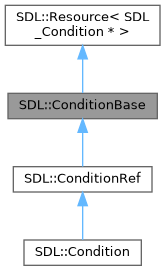A means to block multiple threads until a condition is satisfied. More...

Public Member Functions | |
| ConditionBase () | |
| Create a condition variable. | |
| void | Signal () |
| Restart one of the threads that are waiting on the condition variable. | |
| void | Broadcast () |
| Restart all threads that are waiting on the condition variable. | |
| void | Wait (MutexBase &mutex) |
| Wait until a condition variable is signaled. | |
| bool | WaitTimeout (MutexBase &mutex, std::chrono::milliseconds timeout) |
| Wait until a condition variable is signaled or a certain time has passed. | |
| constexpr | Resource (T resource={}) |
| Constructs the underlying resource. | |
| constexpr | Resource (std::nullptr_t) |
| Equivalent to default ctor. | |
| constexpr | Resource (std::nullopt_t) |
| Equivalent to default ctor. | |
| Resource (const Resource &other)=delete | |
| Resource (Resource &&other)=delete | |
 Public Member Functions inherited from SDL::Resource< SDL_Condition * > Public Member Functions inherited from SDL::Resource< SDL_Condition * > | |
| constexpr | Resource (SDL_Condition * resource={}) |
| Constructs the underlying resource. | |
| constexpr | Resource (std::nullptr_t) |
| Equivalent to default ctor. | |
| constexpr | Resource (std::nullopt_t) |
| Equivalent to default ctor. | |
| Resource (const Resource &other)=delete | |
| Resource (Resource &&other)=delete | |
| Resource & | operator= (const Resource &other)=delete |
| Resource & | operator= (Resource &&other)=delete |
| constexpr | operator bool () const |
| True if contains a valid resource. | |
| constexpr bool | operator== (const Resource &other) const=default |
| Comparison. | |
| constexpr bool | operator== (std::nullopt_t) const |
| Comparison. | |
| constexpr bool | operator== (std::nullptr_t) const |
| Comparison. | |
| constexpr SDL_Condition * | get () const |
| Return contained resource;. | |
| constexpr SDL_Condition * | release (SDL_Condition * newResource={}) |
| Return contained resource and empties or replace value. | |
| constexpr const SDL_Condition * | operator-> () const |
| Access to fields. | |
| constexpr SDL_Condition * | operator-> () |
| Access to fields. | |
Detailed Description
Condition variables, paired with an MutexBase, let an app halt multiple threads until a condition has occurred, at which time the app can release one or all waiting threads.
Wikipedia has a thorough explanation of the concept:
https://en.wikipedia.org/wiki/Condition_variable
- Since
- This struct is available since SDL 3.2.0.
- Category:
- Resource
- See also
- Condition
- ConditionRef
Constructor & Destructor Documentation
◆ ConditionBase()
|
inline |
- Postcondition
- a new condition variable or nullptr on failure; call GetError() for more information.
- Since
- This function is available since SDL 3.2.0.
Member Function Documentation
◆ Broadcast()
|
inline |
- Thread safety:
- It is safe to call this function from any thread.
- Since
- This function is available since SDL 3.2.0.
◆ Signal()
|
inline |
- Thread safety:
- It is safe to call this function from any thread.
- Since
- This function is available since SDL 3.2.0.
◆ Wait()
|
inline |
This function unlocks the specified mutex and waits for another thread to call ConditionBase.Signal() or ConditionBase.Broadcast() on the condition variable cond. Once the condition variable is signaled, the mutex is re-locked and the function returns.
The mutex must be locked before calling this function. Locking the mutex recursively (more than once) is not supported and leads to undefined behavior.
This function is the equivalent of calling ConditionBase.WaitTimeout() with a time length of -1.
- Parameters
-
mutex the mutex used to coordinate thread access.
- Thread safety:
- It is safe to call this function from any thread.
- Since
- This function is available since SDL 3.2.0.
◆ WaitTimeout()
|
inline |
This function unlocks the specified mutex and waits for another thread to call ConditionBase.Signal() or ConditionBase.Broadcast() on the condition variable cond, or for the specified time to elapse. Once the condition variable is signaled or the time elapsed, the mutex is re-locked and the function returns.
The mutex must be locked before calling this function. Locking the mutex recursively (more than once) is not supported and leads to undefined behavior.
- Parameters
-
mutex the mutex used to coordinate thread access. timeout the maximum time to wait, in milliseconds, or -1 to wait indefinitely.
- Returns
- true if the condition variable is signaled, false if the condition is not signaled in the allotted time.
- Thread safety:
- It is safe to call this function from any thread.
- Since
- This function is available since SDL 3.2.0.
The documentation for this struct was generated from the following file:
- SDL3pp/SDL3pp_mutex.h